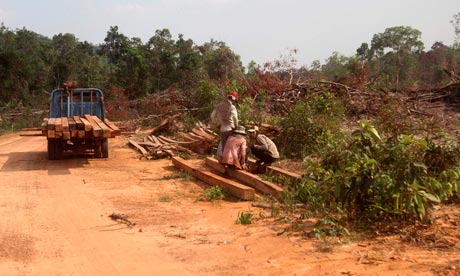Sections of community forest allegedly bulldozed despite prime minister Hun Sen forcibly speaking out against land seizures

Land is cleared for new homes in Koh Kong
province. Land disputes have surfaced in Prey Trolach, with the alleged
clearing of community forest. Photograph: Samrang Pring/Reuters
Cambodian soldiers and police have been clearing undergrowth
with pesticides and using bulldozers to bring down trees in an area of
community forest, according to local groups.
The alleged land seizure at the 1,335 hectare (3,300 acre) Prey Trolach
commune forest, a four-hour drive from the capital Phnom Penh, began
five to six weeks ago.
"The military simply went into the
forest and started chopping down trees," said John Macgregor, a project
adviser for After the Flood, a coalition of NGOs working on livelihood
projects. "First they poisoned the undergrowth, then brought in
bulldozers to knock down trees. They've cleared nearly 200 hectares,
which are now wasteland, and the rest is likely to follow."
Macgregor
tried to go to the area two weeks ago but was told it was too
dangerous. "I didn't get very far. I stood on the hill overlooking the
area," he said, adding that attempts at negotiations between the local
authorities and the ministry of agriculture with the soldiers failed to
stop the tree-cutting. "The gun trumps the law," Macgregor added.
The
Prey Trolach forest in Roka Kiri district in Battambang province was
established in 2004 and has gained national recognition from the
ministry of agriculture, forestry and fisheries.
Planting
of crops has already started on land that has been taken, according to
After the Flood. The military have planted about 40 hectares of corn on
land they cleared, and the military police have planted about 10
hectares, with activity stepping up this week. There is now a road from
the disputed land's southern to northern boundaries. The alleged seizure
came just after a speech by the prime minister, Hun Sen, in which he
spoke out forcibly against land "grabs", an issue that was flagged up by the UN special rapporteur for Cambodia during a visit in May.
Surya
Subedi, professor of international law at Leeds University, said
companies that have seized land, confiscated livestock, and destroyed
homes and property had gone unpunished and that all communities he had
met raised the issue of misconduct by concession companies or their
subcontractors.
More than 400,000 Cambodians have been
affected by land "grabs" and evictions since 2003, according to the
Cambodian league for the promotion and defence of human rights (Licadho),
which works in 12 provinces across half the country. Last year there
was a big increase in land disputes, the group said, with an additional
11,000 families affected.
Land ownership was abolished
under the communist reign of the Khmer Rouge (1974-79), leaving millions
of Cambodians without title deeds and therefore vulnerable to domestic
and foreign land disputes, as well as agriculture, mining and real
estate projects.
In January, 300 families were dispersed without warning from the downtown slum of Borei Keila in Phnom Penh. Last year, the World Bank froze its loans to Cambodia over the forced removal of 10,000 residents of Boeung Kak lake,
who were moved to build luxury flats and high-end shops for the
development firm, Shukaku, owned by a senator from the ruling People's
party.
In May, Hun Sen postponed the granting of new
economic land concessions and called for a review of all existing
concessions with a view to protecting the interests of communities.
"The
incursion began immediately after a recent speech by Hun Sen demanding
an end to illegal land grabbing, so it was certainly strange timing,"
Macgregor said. "The PM seems to be passionately opposed to this kind of
deforestation, which he knows is bringing Cambodia
a bad reputation. So it's a mystery to us why this operation is
proceeding. Either these military people have managed to keep it secret
from him to date, or their greed has overwhelmed them. Two hundred of
these hectares were granted by Hun Sen himself. So a third possibility
is that these people are challenging the PM's power – seeing how far
they can go. I just don't know."

No comments:
Post a Comment